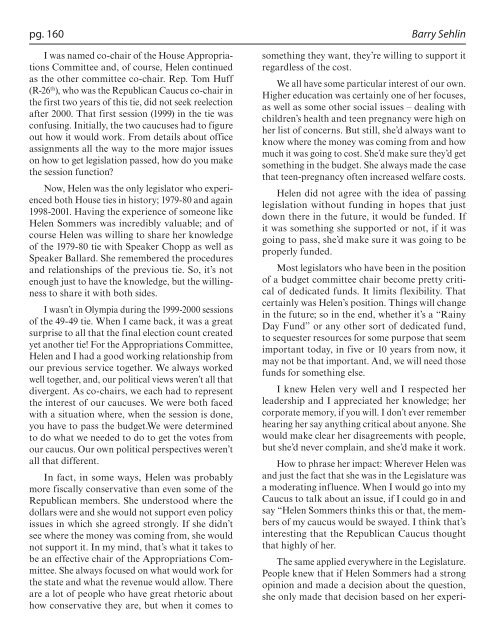Helen Sommers: An Oral History
Helen Sommers: An Oral History
Helen Sommers: An Oral History
Create successful ePaper yourself
Turn your PDF publications into a flip-book with our unique Google optimized e-Paper software.
pg. 160 Barry Sehlin<br />
I was named co-chair of the House Appropriations<br />
Committee and, of course, <strong>Helen</strong> continued<br />
as the other committee co-chair. Rep. Tom Huff<br />
(R-26 th ), who was the Republican Caucus co-chair in<br />
the first two years of this tie, did not seek reelection<br />
after 2000. That first session (1999) in the tie was<br />
confusing. Initially, the two caucuses had to figure<br />
out how it would work. From details about office<br />
assignments all the way to the more major issues<br />
on how to get legislation passed, how do you make<br />
the session function?<br />
Now, <strong>Helen</strong> was the only legislator who experienced<br />
both House ties in history; 1979-80 and again<br />
1998-2001. Having the experience of someone like<br />
<strong>Helen</strong> <strong>Sommers</strong> was incredibly valuable; and of<br />
course <strong>Helen</strong> was willing to share her knowledge<br />
of the 1979-80 tie with Speaker Chopp as well as<br />
Speaker Ballard. She remembered the procedures<br />
and relationships of the previous tie. So, it’s not<br />
enough just to have the knowledge, but the willingness<br />
to share it with both sides.<br />
I wasn’t in Olympia during the 1999-2000 sessions<br />
of the 49-49 tie. When I came back, it was a great<br />
surprise to all that the final election count created<br />
yet another tie! For the Appropriations Committee,<br />
<strong>Helen</strong> and I had a good working relationship from<br />
our previous service together. We always worked<br />
well together, and, our political views weren’t all that<br />
divergent. As co-chairs, we each had to represent<br />
the interest of our caucuses. We were both faced<br />
with a situation where, when the session is done,<br />
you have to pass the budget.We were determined<br />
to do what we needed to do to get the votes from<br />
our caucus. Our own political perspectives weren’t<br />
all that different.<br />
In fact, in some ways, <strong>Helen</strong> was probably<br />
more fiscally conservative than even some of the<br />
Republican members. She understood where the<br />
dollars were and she would not support even policy<br />
issues in which she agreed strongly. If she didn’t<br />
see where the money was coming from, she would<br />
not support it. In my mind, that’s what it takes to<br />
be an effective chair of the Appropriations Committee.<br />
She always focused on what would work for<br />
the state and what the revenue would allow. There<br />
are a lot of people who have great rhetoric about<br />
how conservative they are, but when it comes to<br />
something they want, they’re willing to support it<br />
regardless of the cost.<br />
We all have some particular interest of our own.<br />
Higher education was certainly one of her focuses,<br />
as well as some other social issues – dealing with<br />
children’s health and teen pregnancy were high on<br />
her list of concerns. But still, she’d always want to<br />
know where the money was coming from and how<br />
much it was going to cost. She’d make sure they’d get<br />
something in the budget. She always made the case<br />
that teen-pregnancy often increased welfare costs.<br />
<strong>Helen</strong> did not agree with the idea of passing<br />
legislation without funding in hopes that just<br />
down there in the future, it would be funded. If<br />
it was something she supported or not, if it was<br />
going to pass, she’d make sure it was going to be<br />
properly funded.<br />
Most legislators who have been in the position<br />
of a budget committee chair become pretty critical<br />
of dedicated funds. It limits flexibility. That<br />
certainly was <strong>Helen</strong>’s position. Things will change<br />
in the future; so in the end, whether it’s a “Rainy<br />
Day Fund” or any other sort of dedicated fund,<br />
to sequester resources for some purpose that seem<br />
important today, in five or 10 years from now, it<br />
may not be that important. <strong>An</strong>d, we will need those<br />
funds for something else.<br />
I knew <strong>Helen</strong> very well and I respected her<br />
leadership and I appreciated her knowledge; her<br />
corporate memory, if you will. I don’t ever remember<br />
hearing her say anything critical about anyone. She<br />
would make clear her disagreements with people,<br />
but she’d never complain, and she’d make it work.<br />
How to phrase her impact: Wherever <strong>Helen</strong> was<br />
and just the fact that she was in the Legislature was<br />
a moderating influence. When I would go into my<br />
Caucus to talk about an issue, if I could go in and<br />
say “<strong>Helen</strong> <strong>Sommers</strong> thinks this or that, the members<br />
of my caucus would be swayed. I think that’s<br />
interesting that the Republican Caucus thought<br />
that highly of her.<br />
The same applied everywhere in the Legislature.<br />
People knew that if <strong>Helen</strong> <strong>Sommers</strong> had a strong<br />
opinion and made a decision about the question,<br />
she only made that decision based on her experi-
















